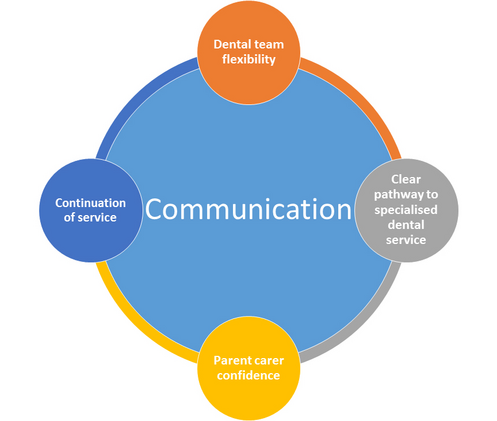Dentistry and autism: parental experiences
Published on 01 March 2018
Author: Nicole Thomas
Nicole Thomas is a dental hygienist who, inspired by her work and own experience, carried out research on parents' views of visiting the dentist with their autistic child. Nicole discusses the research, its aims, findings and the wider implications for dentistry.
How it began
I am a very proud mum of a nearly 6 year old autistic boy and a neurotypical 8 year old girl. That’s my main job! My other profession is dental hygienist. It was through discussions with other parents of autistic children, after they found out what I did for a living, that the difficulties in accessing dental care for autistic children was highlighted.
Every story was the same: incredible difficulties to get compliance with self-care such as tooth-brushing and diets, compounded by lack of support from local dental services. Many of these children were having multiple extractions under general anaesthetic, including one little boy who required a full clearance of his baby teeth at the age of 4.
This was certainly enough of an incentive for me to want to explore this situation further. I applied for a professional training grant which enabled me to work alongside and learn from researchers at the universities of Plymouth and Exeter. Together we carried out a qualitative study to explore parents’ experiences of taking an autistic child for a dental examination.
Aims
The aim of the research was to find out:
- what difficulties autistic children and their families experience when trying to access high street dental examinations
- what strategies parents, autistic children and dentists use to overcome these difficulties
- what dentists could do to improve their services
- what information should dentists provide to prepare an autistic child for a visit to the dentist.
Method – how it worked/who was involved
I interviewed 17 parents of autistic children with a diagnosis or currently being assessed. The parents volunteered to take part after seeing information posted about the research on social media or from visits I made to autism support groups. The interviews were transcribed and we identified key themes arising from our discussions with parents.
A separate working group of six parents of autistic children advised the research team at each stage of the process, for example:
- how to recruit parents to interview
- testing the interview questions
- checking if our interpretations of the results was authentic and made sense.
Findings/outcomes
We found that five factors needed to be present to increase the chance of dental check-up success; we defined this as a visit to the dentist where a basic examination of the child’s teeth was achieved with no adverse effects during the examination or after the event. The diagram below shows how these factors are linked together with communication central to all.

Parents expressed a lack of confidence in approaching the dentist when issues arose. They often assumed that the dentist’s education had provided enough training to understand and support individuals who struggled attending dental examinations. For those parents confident enough to ask for minor changes to meet their child’s individual needs, they reported that these requests were often met with reluctance. Therefore, despite their best efforts, dental visits were largely unsuccessful.
Dental teams that took time to respond flexibly to parental requests for support had more positive experiences. Check-ups were also positive when the whole dental team became involved in the care of the child. This was demonstrated by one dental team who discovered a boy’s love for washing machines. There was a washing machine at the practice so the receptionists would take him to see it if the dentist was running late, or after his check-up.
Helpful strategies included providing information on what to expect before a check-up and making thorough notes so parents did not have to repeat themselves at every appointment. This continuity before and after a check-up was really valued by participating families.
In addition, dentists knowing when and where to refer a child to specialist dental services avoided delays in children getting the dental care that was appropriate for them outside of the high street dental setting.
Autistic children are first and foremost individuals with differing needs, so specific autism training wasn’t seen as of paramount importance - rather an individualised approach was desired. However, parents did want the dental team to have a better understanding of the impact a dental visit can have on them as a family, from the amount of preparation it takes, to the effect should a dental visit result in a meltdown or similar.
Implications for dentistry
For me this study really highlighted the importance of clear and open communication between parents and the dental teams, and the need to form a collaborative partnership that works in the best interests of all. Being open to suggestions and flexible to make adaptations could open the door to many autistic children who don’t require a referral to specialist dental services, but who may find a dental environment challenging, being able to visit their local dentist along with the rest of their family. Which, I only know too well, means one less challenge for a family with an autistic child.



